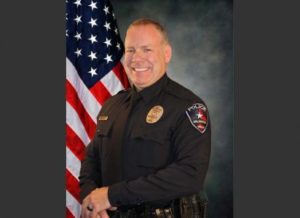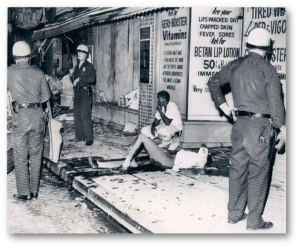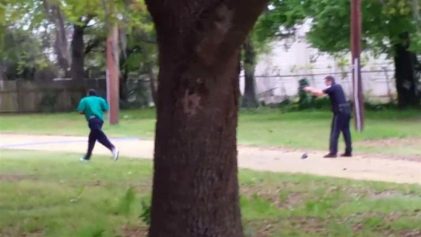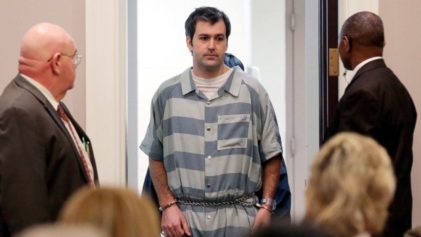There was a dramatic turn of events in the case of a Black college football player who was fatally shot by a white rookie police officer in Arlington, Texas— providing further evidence that a Black-led movement against police violence is having an impact towards reform.
Officer Brad Miller, 49, was dismissed for “inappropriate judgment” in handling a situation leading to the fatal shooting of Christian Taylor, 19, an Arlington native and a football player at Angelo State University in West Texas. The defensive back was set to begin his sophomore year this week.
Miller shot Taylor to death after the teen reportedly broke into the Classic Buick GMC car dealership. Will D. Johnson, the Arlington police chief, said Miller was fired for making mistakes in the fatal shooting, including entering the dealership without his more experienced partner, leading to “an environment of cascading consequences.” At a news conference, Chief Johnson also cited the rookie’s poor communication with other officers, and the failure to have a plan for arrest when confronting Taylor on his own.

FILE- This undated file photo provided by the Arlington Police Department shows police officer Brad Miller, who killed an unarmed college football player during a suspected burglary at a Texas car dealership. (Arlington Police Department via AP, File)
Miller, who was hired in the fall and was still in training, reportedly fired four rounds and shot Taylor in the neck, chest and abdomen. According to Johnson, Miller fired a gun shot, then Miller’s partner, Corporal Dale Wiggins, attempted to subdue Taylor with a Taser, followed by Miller firing three more shots at the teen.
This latest news is a sharp departure from the original story, in which the police maintained there had been a confrontation between Miller and Taylor, and that Miller had attempted to arrest the student. However, providing a detailed account of the incident and calling the death a “tragedy,” the police chief stated that Taylor had made no physical contact with police, but rather Officer Miller had escalated the situation.
Johnson said Miller told investigators he had feared for his safety and believed Taylor would overpower him. The rookie also reportedly thought he was alone, although his training officer was four feet away.
The Arlington police department requested FBI involvement in the investigation, which the federal agency declined, absent evidence of a federal civil rights violation.
The firing of Officer Miller is the latest example of how the #BlackLivesMatter movement has forced police departments across the country to act quickly and with transparency, and implement reforms to their policies and practices. Amid the constant pressure of protesters out in the streets, venting their frustrations and expressing their grievances, police departments want to avoid having this movement come to their town.
There have been other examples, including the indictment of former North Charleston officer Michael Slager for murder in the April 2015 shooting death of Walter Scott, 50. A video taken by an onlooker showed Slager shooting a fleeing Scott in the back. In Baltimore, six police officers were charged in the murder of Freddie Gray, 25, who died in a police van the same month that Walter Scott was killed. And in July, University of Cincinnati police officer Ray Tensing was indicted for the murder of Samuel Dubose, 43, an unarmed motorist shot in the head during a traffic stop. A body camera contradicted the officer’s claims he acted in self-defense, and also showed other officers conspiring to cover up the crime.
Meanwhile, the Christian Taylor case comes on the first anniversary of the death of Michael Brown, who was shot to death by a police officer in Ferguson, Mo. on August 9, 2014, sparking protests and unrest, and igniting a Black-led movement for racial justice.
However, in a perfect example of how the more things change, the more they remain the same, this is also the 50th anniversary of the Watts riots. The urban rebellion, which lasted from August 11-17, resulted in 34 dead and over 1,000 wounded, nearly 4,000 arrested and 600 buildings damaged. Moreover, the 1965 riots led to three subsequent long, hot summers of urban rebellion. Half a century ago, the spark in Watts was a white California highway patrolman pulling over a Black motorist named Marquette Frye for drunken driving. However, the police incident and the ensuing riots exposed underlying problems, including lack of employment opportunities for Black people, substandard schools, housing segregation, systemic discrimination and Black hopelessness.
The Watts riots also reflected Black anger over the police state in which they lived, and racist and brutal cops, who in the words of Malcolm X, “paint the Negro community as a criminal element” and “move into the Negro community exercising Gestapo tactics, stopping any black man who is on the sidewalk, whether he is guilty or whether he is innocent…”
Back then, Los Angeles activists struggled against the racial injustice of their day, in light of tragic events such as the 1962 killing of Ronald Stokes, an unarmed Nation of Islam secretary. The LAPD refused to enact reforms as a result.
Fifty years after Watts and a year after Fergsuon, the death of Christian Taylor reveals that the problems plaguing the Black community continue, the struggle continues, and white supremacy does not sleep.




